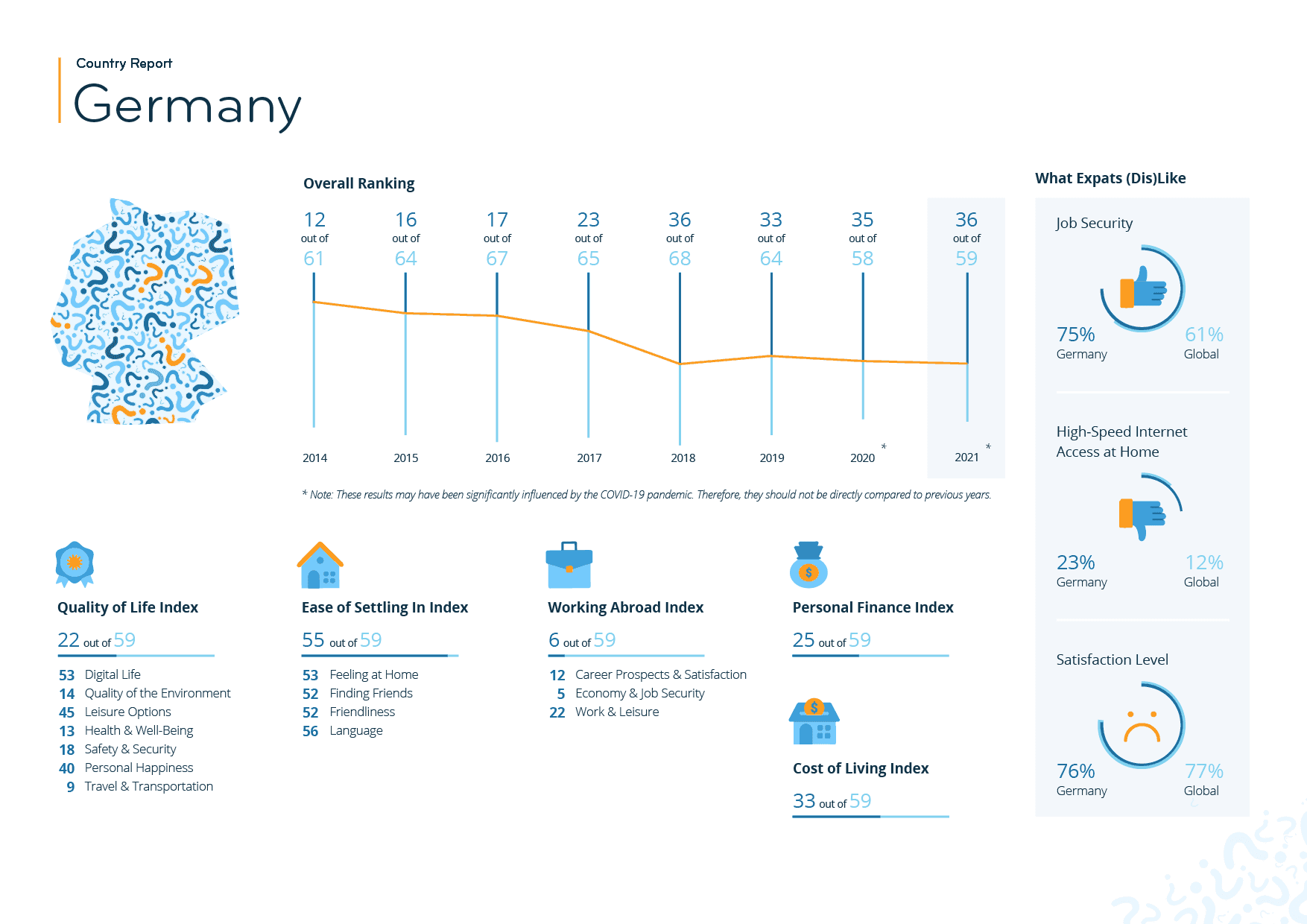Germany: Good Careers versus the Challenges of Settling In
Expats in Germany are happy with their jobs and career opportunities, but they do not feel at home and are struggling to make local friends.
Top Findings
- 85% of expats are happy with the state of the local economy (vs. 62% globally).
- Germany lands in the bottom 5 in the Ease of Settling In Index (55th).
- 92% of expats are happy about their travel opportunities (vs. 84% globally).
- 23% find it difficult to get high-speed internet (vs. 12% globally).
- Most expats (72%) are satisfied with the official communication regarding COVID-19.

Good Job Opportunities for Expats
Coming 36th out of 59 countries in the Expat Insider 2021 survey, Germany’s strongest suit is the Working Abroad Index (6th). It even ranks fifth worldwide in the Economy & Job Security subcategory: three in four expats (75%) rate their job security positively (vs. 61% globally), and 85% are happy with the state of the local economy (vs. 62% globally). “Germany is a stable country. There are international companies offering good job opportunities, and the economy is strong,” says a Spanish expat. In fact, 58% are satisfied with the local career opportunities (vs. 45% globally). And the proportion of expats working full time in Germany is almost ten percentage points higher than the global average (64% vs. 55% globally).
There are international companies offering good job opportunities.
It’s Hard to Make German Friends
However, Germany lands in the bottom 10 for the Ease of Settling In Index (55th) as well as all its subcategories: Feeling at Home (53rd), Language (56th), Finding Friends (52nd), and Friendliness (52nd). More than a quarter of expats (26%) rate the general friendliness of the German population negatively (vs. 16% globally), 30% do not feel at home in the local culture (vs. 20% globally), and 52% have trouble making local friends (vs. 36% globally). Moreover, only 19% say their friends and acquaintances are mostly locals. As a comparison, in Mexico — the best-ranking country for Finding Friends — 36% are mostly friends with local residents. And while 38% of respondents in Germany are mostly friends with other expats, this applies to only 13% in Mexico. “It is very difficult to make new friends in Germany, unless you belong to an expat club,” shares a South African expat.
It is very difficult to make new friends in Germany.
Digital Life Fails to Impress
Germany shows a fairly average performance in the Personal Finance (25th) and Cost of Living (33rd) Indices. It ranks slightly higher in the Quality of Life Index (22nd): the majority of expats (92%) is happy about their travel opportunities (vs. 84% globally), putting the country at seventh place for this factor and ninth place in the Travel & Transportation subcategory. However, Germany loses points in the Digital Life subcategory (53rd): 28% say it is hard to pay without cash (vs. 9% globally), and 23% find it difficult to get high-speed internet (vs. 12% globally). A US American expat even claims: “The country is technologically still in the 1980s.”
The Impact of COVID-19 on Expat Life
The pandemic has changed the plans of many expats worldwide. In Germany, this is true for 29% of respondents (vs. 37% globally). Only 8% will move either to a different foreign country or back home sooner than originally planned (vs. 11% globally), while 14% have decided to not move back home in the near future because of COVID-19 (vs. 18% globally). Among those who will be moving back home earlier than planned, 37% do so to be closer to their family and friends (vs. 33% globally). An even higher share (39%) wants to go back home because they feel lonely and socially isolated in Germany, almost twice the global average (20%).
When it comes to staying up to date, half the respondents in Germany (50%) use the local news as their source of information during the pandemic (vs. 47% globally), and most expats (72%) are satisfied with the official communication regarding COVID-19 (vs. 66% globally).
Further Reading
Advertisement
Join InterNations
The community for expats worldwide
Download

